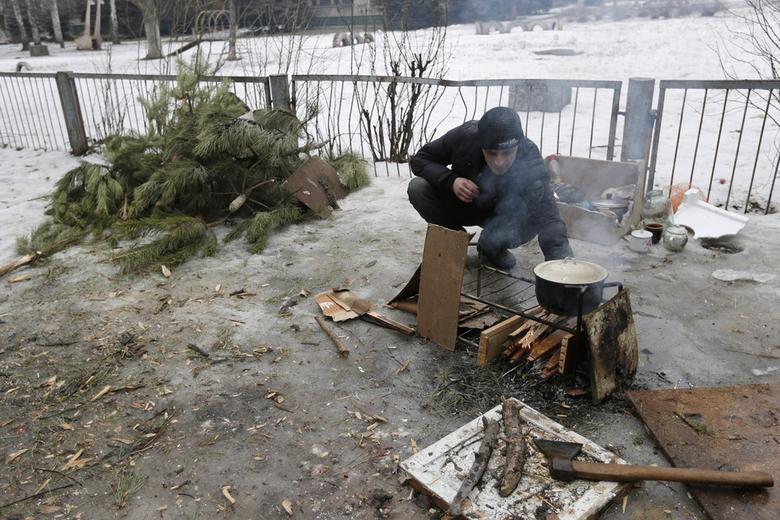
WANTED MORE MONEY

The European Union should share the cost of filling Ukraine's natural-gas storage if it wants to prepare for worst-case scenarios next winter, the country's energy minister said in an interview, highlighting a potential clash in coming negotiations between the EU, Kiev and Moscow.
An EU-mediated deal that helped maintain gas supplies to Ukraine and the rest of Europe during the winter expires at the end of March. The comments by Volodymyr Demchyshyn, a former investment banker who took office in December, underline how difficult it will be to reach a follow-up agreement that ensures deliveries over the summer and beyond.
About half of the EU's gas imports from Russia pass through Ukraine.
Mr. Demchyshyn also warned that the government in Kiev might decide to cut off shipments to regions controlled by pro-Russian separatists because of a failure by local energy distributors to pay for the gas they receive. Such a move would further provoke Russia, whose president, Vladimir Putin , said last week that halting shipments to rebel-held areas "smells of genocide."
"If they are not paying, I'm turning off" supplies, Mr. Demchyshyn said. "It's not because they are rebels; it's because they are not paying."
A promise by Kiev to maintain deliveries to eastern Ukraine had been central to the current gas deal with Moscow and forms part of a tenuous peace plan signed in Minsk, Belarus, last month. But Mr. Demchyshyn said Ukraine's state-owned gas company Naftogaz had been paid only for some 20% of the 1.5 billion cubic meters of gas it had shipped to eastern Ukraine since August, while electricity payments from the rebel regions are at 35%.
"We are saving on our pensioners, we are saving on infrastructure, we are saving on medicine, on hospitals; we are saving on kindergartens and paying for gas to [the East]," he said. Naftogaz spends $60 million to $100 million a month on gas supplies to the separatist territories, he said. "It doesn't look reasonable."
Reaching a new deal on gas deliveries soon after the current one expires is important not only to Ukraine but also to the EU. The warmer summer months are used to fill Ukraine's huge underground storage facilities, which help buffer supply shortages during the winter and maintain pressure in the pipeline network to allow efficient gas transit to Europe.
Maros Sefcovic, the European Commission's vice president for energy who will mediate the new round of gas talks, said on Thursday that going into the winter, Ukraine's storage facilities need to hold some 20 billion cubic meters of gas and that purchases to refill then should start in April.
Mr. Demchyshyn, however, in the interview said 14 billion to 15 billion cubic meters—similar to the volumes held last fall—would be sufficient.
"The commissioners are developing worst-case scenarios. They are putting all the cost on us," Mr. Demchyshyn said. "We are ready to commit to [a] base case and pay for it. And [the cost of] worst-case scenarios maybe should be shared." Such a scenario could include a prolonged supply cut by Russia, a cold winter and a resurgence in industrial activity in Europe.
Mr. Demchyshyn said Ukraine currently pays a 15% premium on Russian gas, compared with supplies it receives from Slovakia and other EU countries. Filling its storage with that additional 5 billion cubic meters of largely Russian gas would cost Ukraine an extra $1.5 billion of cash that would be expensive to raise amid a worsening economic crisis and the conflict in its east.
Instead, Mr. Demchyshyn said, European companies, which have much-lower capital costs, should rent capacity in Ukraine's storage facilities. "They can fill up the storage with their funding," he said.
Ukraine has been working hard to reduce its reliance on Russian gas. Under pressure from the International Monetary Fund, the government nearly tripled energy prices for consumers earlier this week, a move Mr. Demchyshyn said could help cut consumption and iron out inefficiencies. That, along with other overhauls of its internal energy market, could help make his country independent of shipments from Russia within three to four years, he said.
Among those changes could be a split and partial privatization of gas company Naftogaz, which would separate its oil- and gas-production arm from the pipeline network, in line with EU competition rules.
"Ukraine is ready to put up...minority stakes in strategic companies for privatization, which will bring not just technology, not just corporate governance and finances, but also a new psychology in operations management," Mr. Demchyshyn said, adding that the process for privatization would be initiated this year.
Actually getting investors interested in buying parts of a company that still relies heavily on state subsidies could be more difficult. "The key problem to happening of this is the war," Mr. Demchyshyn said. "There is no queue-unfortunately—standing outside."
wsj.com





